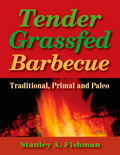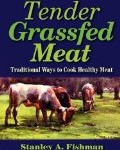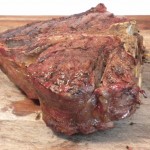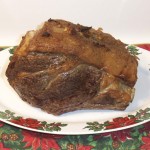More Blessings from Pastured Butter
By Stanley A. Fishman, author of Tender Grassfed Meat
Many of us know the many nutritional benefits of butter. We know that butter was a sacred food that was considered vital for health by many traditional societies. We know that butter was so common and so important in traditional Western nutrition that it was eaten at every meal, by everyone who could get it, from peasant to king. Huge numbers of people have experienced many benefits from eating pastured butter, from weight loss to mood improvement to substantial improvements in many body functions. By pastured butter, we are talking about the pure, undiluted butter made from the milk of cows grazing on pasture.
But there is more to butter than nutrition. The ancient Greeks and Romans maintained numerous herds of sheep, cattle, and goats, mainly for the milk. They made huge amounts of butter. But they did not eat it.
Why not? Because to the ancient Greeks and Romans, butter was too valuable to eat!
How Butter Was Used in Ancient Greece and Rome
Butter was used to heal and maintain health. It was rubbed into the skin to protect it from the sun and keep the skin soft and supple. Butter was applied to the joints to revitalize them and cure aches. Butter was gently applied to bruises and swellings to reduce and heal them. Butter was applied to sore and aching knees, and was used to effectively treat arthritis. Butter was massaged into the muscles to nourish them and make them strong. Butter was applied to strained muscles to relieve pain and to help them heal. Butter was applied to the face to remove wrinkles and keep the skin young. The competitors in athletic events were often massaged with butter prior to competing, as it was believed to be a performance enhancer. Butter was sometimes eaten, as a medicine, to treat infertility. Butter was also taken internally to calm the nerves and reduce anxiety.
Butter was also rubbed into the sore feet of travelers who had walked a long way, to relieve the pain and swelling. Butter was applied to bags under the eyes to remove them. Butter was rubbed into the scalp to increase the hair’s health, body, and thickness. Butter was also rubbed into the skin to relieve and prevent sunburn. Butter was rubbed into the areas around broken bones, as it was believed to stimulate healing. Butter was held in the mouth to relieve sore gums and internal mouth injuries.
The Greek and Roman doctors were known for their skill in healing, and they often used butter for this purpose.
The Robust Good Health of the Ancient Greeks and Romans
Modern medicine arrogantly assumes that the ancient Greeks and Romans lived short lives, and had poor medical care. This is based largely on the examination of skeletons by archaeologists, who decide the age of the skeleton from the condition of the bones and joints. The comparison is to the skeletons of modern people, which is questionable because it assumes that ancient peoples would have the same bone density and characteristics of modern skeletons. It is quite likely that well nourished, physically active ancient peoples would have much stronger and thicker bones than sedentary modern people eating factory food. This means that a 70-year-old ancient Greek might have a skeleton comparable to that of a 30-year-old modern man who was raised on factory food.
The fact that many ancient Greeks and Romans lived to a healthy and robust old age is supported by the extensive writings of the Greeks and Romans themselves. These records make it clear that many of them were active into their seventies and eighties, and men of that age were not invalids, but were expected to do everything younger men did. This included fighting in the military. All Greek male citizens were expected to fight in the phalanx (a dense formation of spearmen wearing heavy armor). Hand to hand combat wearing heavy armor, and using heavy weapons, is an incredibly strenuous activity. Age did not excuse the duty to march and fight. These men were expected to march in heavy armor for many miles, and to fight a battle at the end of the march.
The soldiers of the early Roman Republic were divided into different classes based on age. Every male citizen had to serve in the military.
The Triarii of the early Roman Republic were the oldest men, often in their sixties and seventies. They carried the heaviest armor and weapons. Like the other soldiers, they were expected to march 15 to 20 miles a day, carrying over 100 pounds of armor and equipment, and be ready to fight a strenuous physical battle at any time.
How many modern senior citizens would be capable of this kind of activity?
Ancient Butter Wisdom Helps a Modern Injury
The additional blessings of butter were shown to me by a recent incident. A person, who prefers to remain anonymous, fell face down on a wet sidewalk. Many scrapes and cuts occurred on the face, forehead, nose, and upper lip. The cut on the upper lip was particularly deep, so deep it damaged the interior of the mouth. Both eyes were blackening, and large bags were appearing under the eyes. The swelling was restricting the field of vision. As conventional medicine offered nothing but stitches, ice packs, drugs, and antibiotics, the decision was made to try alternate remedies. Pastured butter was applied to the bruised and swollen areas, but not directly on the eyes or on broken skin. Within a day, the black eyes turned to red, and the red was gone within a couple days. The bags under the eyes shrunk quickly, and were soon gone. Pain and discomfort were quickly relieved. The field of vision became normal as the swelling shrunk. The injured area in the mouth began to heal quickly when butter was held there. The scrapes and cuts healed quickly, and complete healing took place within two weeks.
Everything healed. While natural disinfectants and other alternate remedies were also used, the injured person is certain that the application of butter played a crucial part in the healing.
I am just reporting on what happened, not making medical recommendations.
Butter has many blessings.
Related Posts
The Blessings of Bread and Butter
Don’t Fear the Natural Trans Fats in Grassfed Meat and Butter
This post is part of Monday Mania blog carnival.
Sorry, the comment form is closed at this time.
Read more
« Delicious, Festive, and Healthy—Christmas Liverloaf
My Podcast Interview at Our Natural Life »


 Photos of recipes from the new book Tender Grassfed Barbecue
Photos of recipes from the new book Tender Grassfed Barbecue
 Photos of recipes from the cookbook Tender Grassfed Meat
Photos of recipes from the cookbook Tender Grassfed Meat
